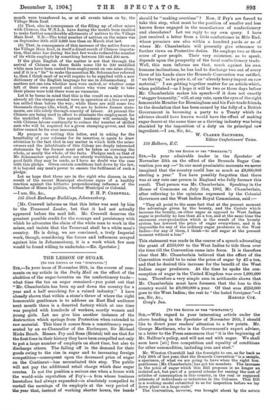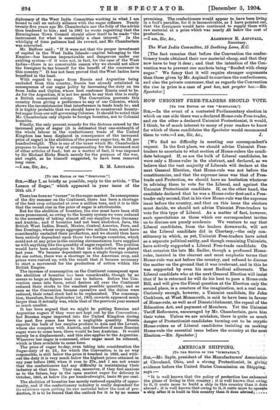SIR,-With regard to your interesting article under the above heading
in the Spectator of November 26th, I should like to direct your readers' attention to a few points. Mr. George Martineau, who is the Government's expert adviser, in a letter to the Press announces that" it is the beginning of Mr. Balfour's policy, and will not end with sugar. We shall soon have [sic] free competition and equality of conditions for other commodities, including iron and steel."
Mr. Winston Churchill had the foresight to see, as far back as July 29th of last year, that the Brussels Convention "is a sample, a specimen, of what we are going to have when the right hon. gentleman [Mr. Chamberlain] has got his mandate. The increase in the price of sugar which this Bill proposes is no longer an isolated act, but part of a general scheme for raising the cost of articles of consumption in this country, in the real or supposed interests of individuals or industries in the Colonies. This Bill is a working model submitted to us for inspection before we lay down plant on a large scale." The Convention, however, was brought about by the astute diplomacy of the West India Committee working in what I am bound to call an unholy alliance with the sugar refiners. Nearly twenty-five years ago Mr. Chamberlain saw the folly of the advice then tendered to him ; and in 1881 he wrote regretting that the Birmingham Town Council should allow itself to be made "the instrument for what is essentially a class interest." In the whirligig of time patience had its reward, and Mr. Chamberlain was converted.
Mr. Balfour said : "If it were not that the proper investment of capital in the West India Islands—capital belonging to the Empire—has become impracticable and dangerous under our existing system—if it were not, in fact, for the case of the West Indies—there is no conceivable reason why we should not allow the foreigner to tax himself for the benefit of the consumer in this country." It has not been proved that the West Indies have benefited in the least.
With regard to sugar from Russia and Argentine being excluded from this country, Russia has already retaliated in consequence of our sugar policy by increasing the duty on tea from India and Ceylon, whose best customer Russia used to be. As for the Argentine, it is not too much to say that this is really a British commercial colony. The Convention prevents this country from giving a preference to any of our Colonies, which shows the inconsistencies that interference in trade leads to; and it is highly probable that we should have to countervail bounty- fed sugar from our self-governing Colonies. It should be noted that Mr. Chamberlain only objects to foreign bounties, not to Colonial bounties.
Finally, the only present remedy for the distress caused by the increased price of sugar (it is estimated that one-sixteenth of the whole labour in the confectionery trade of the United Kingdom has been displaced in consequence of the increased price of sugar) is the abolition of the present sugar-tax, 4s. 2d. per hundredweight. This is one of the taxes which Mr. Chamberlain proposes to lessen by way of compensating for the increased cost of other articles of food; but as a matter of fact, it was imposed by Sir Michael Hicks Beach merely for the purpose of the war, and ought, as he himself suggested, to have been removed long since.
—I am, Sir, &c., R. M. LEONARD.







































































 Previous page
Previous page